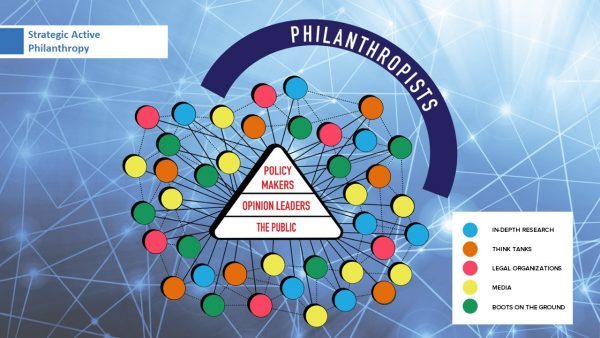This article was originally published in the Jerusalem Post on February 9, 2021.
Some say that it’s more challenging to effectively donate money than to earn it. I agree. It’s a no-brainer to choose the nonprofit organizations you support based on your personal acquaintances or social affiliations, but real impact can only be achieved by creating a strategic philanthropic plan and being willing to implement it.
There have been few experiences in my life more rewarding or meaningful than becoming an active philanthropist.
I arrived in America in 1981, after serving in the Israel Defense Forces, fighting in the 1973 Yom Kippur War on the battlefields of the Suez Canal front, and attending the Technion – Israel Institute of Technology. I came here with my wife Gila and two daughters and worked hard to attain success in my business of investing and operating commercial real estate properties. Eventually, I became a managing partner at Hager Pacific Properties, a private real estate investment firm in Southern California.
As my success in business grew, my philanthropic journey began as well. I adopted the principle of donating one-tenth of my earnings, but I quickly found out that philanthropy works the other way around; whatever I gave, God found mysterious ways to reward me 10 times more.
Gila and I now have the luxury of committing ourselves nearly full time to our philanthropic endeavors and activism. I’ve never worked harder in my life – and never felt like there isn’t enough time to finish the job.
Over the past 20 years, we became affiliated with dozens of new nonprofits every year, discovering their unique advantages and special value propositions. We established the Milstein Family Foundation, through which we have funded hundreds of organizations that support the State of Israel, advance the US-Israel alliance, and fight antisemitism.
Sometimes there were no organizations established to advance a cause we held dear. Whenever I saw a void, I did not hesitate to roll up my sleeves and create a new program or form a new organization. For example, in 2007, I co-founded the Israeli-American Council (IAC), which is now the largest and most influential Israeli-American organization in America.
In 2011, together with the IAC, Gila and I founded Sifriyat Pijama B’America, with the goal of instilling Jewish values in tens of thousands of Israeli-American kids nationwide by delivering free Hebrew-language books to their homes. This project paved the way for the expansion of the IAC from a local Los Angeles organization to the fastest-growing Jewish organization in the US.
More recently, in 2017, I created the Impact Forum, a Los Angeles-based network of philanthropists who meet with and support a network of exceptionally effective small- to medium-size nonprofit organizations in the pro-Israel space.
Being involved with many organizations gives me greater leverage to amplify my impact. I facilitate synergies and collaborations between organizations, learn which groups are effective and which are not, and create connections with a vast network of people.
I’ve come to realize that there are three main approaches to major philanthropy: “specific philanthropy,” “social club philanthropy,” and “strategic impact philanthropy.”
In specific philanthropy, the donor gives to better the lives of specific members of his/her community and issues close to their hearts. The focus is on the personal trust and connections the philanthropist has with the grantees or with the cause.
In social club philanthropy, the benefactor gives to be part of a social or a business group of other like-minded, wealthy, and influential people. The moment the philanthropists exit their social club, the interest in supporting the group and its related issues die.
Strategic impact philanthropy, which I personally practice, requires not only financial giving to a network of nonprofit organizations, but also the investment of time, experience, vision, and personal connections.
To make sure my philanthropy has a high return on investment, I personally help the organizations with funding, provide advice based on my knowledge and experience, establish new organizations and programs to fill voids I see and make use of my extensive network to help these causes and generate synergies that make every group stronger.
Gila and I have seen firsthand how strategic impact philanthropy makes a significant, nationwide impact. We see the results within our lifetime and are able to leave an enduring legacy to our children, grandchildren, and community.
I invite my fellow major philanthropists and philanthropists-to-be to join me in becoming a strategic impact philanthropist. It requires more than just “putting your money where your mouth is” but the return is beyond imaginable. Nothing of lasting impact can be achieved without your own blood, sweat, and tears.
The writer is an active philanthropist, real estate investor, and community leader. Email: [email protected].

